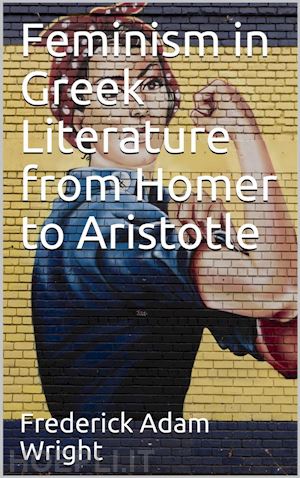There is a question sometimes put to scholars, a doubt often latent in scholars’ minds—How was it that Greek civilisation, with all its high ideals and achievements, fell so easily before what seems at first sight an altogether inferior culture? The difficulty is not solved by a reference to military resources or administrative skill, for moral strength is the only thing that matters in history, and a nation has never yet succeeded merely by pure intellect or by brute force. The fact is—and it is as well to state it plainly—that the Greek world perished from one main cause, a low ideal of womanhood and a degradation of women which found expression both in literature and in social life. The position of women and the position of slaves—for the two classes went together—were the canker-spots which, left unhealed, brought about the decay first of Athens and then of Greece.
For many centuries in Ionia and Athens there was an almost open state of sex-war. At Miletus a woman never sat at table with her husband, for he was the enemy with whom bread must not be broken; at Athens, while all the men went free, women were kept as slaves, and a stranger in the harem might be killed at sight. The sexes were sharply separated: men and women had but few opportunities for mutual esteem and affection, and domestic life—the life of the home, the wife and the children—was poisoned at its source.
At Sparta certainly, and perhaps in North Greece, women occupied a very different place. Spartan women were regarded as free human beings, and the relations between the sexes were inestimably better than at Athens. But Sparta, Thessaly, Macedonia, have no direct representation in Greek literature; we get their point of view only in the writings of some Athenians, such as Plato and Xenophon, who rebelled against the current institutions of their state, and in the Alexandrian poets, Apollonius and Theocritus, who, even in the midst of the luxurious city, kept some of the freshness of their native hills. Most of the great writers came from Ionia or from Athens: the Ionians are nearly all misogynists, and have succeeded in colouring many parts of the Homeric poems with their perverse immorality: the typical Athenian, and those foreigners who found their ideal in Athens—Herodotus, Sophocles, Thucydides, the Orators—usually treat women as a negligible quantity.
Upon his own generation Euripides had a profound effect. Socrates, Aristophanes, Plato, and Xenophon are all feminists in varying degrees, and a fairly full statement of feminist doctrine may be found in their works. But the idealist did not win the day. It is true that women were never so degraded—in European civilisation at least—after Euripides’ time as they had been before; but his teaching did not bear its full fruit. Aristotle—the supreme type of the practical mind—threw all the weight of his unexampled influence into the other scale, and the Aristotelian view of the natural inferiority of women prevailed: so that the poets of Ionia, libertines and profligates as most of them were, find their work completed by the philosopher of Stagirus.
Greek is the source from which most Roman writers drew their inspiration, and although the position of the Roman matron, honoured as the mother of the household, was infinitely higher than that of the too-often childless Athenian wife, there is still an undercurrent of misogyny which permeates Latin literature, and finds its fullest expression in Juvenal. All the venom of earlier writers is collected by the satirist, who adds the bitterness of his own bile, seasoned with the highly-coloured rhetoric which the Romans loved, and finally, with infinite zest, disgorges the mixture in the six hundred lines of the Sixth Satire.












